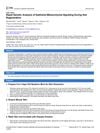134 citations,
July 2020 in “Experimental dermatology” Hair follicles are normally protected from the immune system, but when this protection fails, it can cause hair loss in alopecia areata.
129 citations,
February 2006 in “Andrology” Men with low testosterone should be carefully evaluated and monitored before and during treatment.
98 citations,
March 2019 in “Frontiers in immunology” Damaging mutations in NFKB2 cause a severe and distinct form of primary immunodeficiency with early-onset and often ACTH-deficiency.
 88 citations,
April 2017 in “Journal of Pediatric and Adolescent Gynecology”
88 citations,
April 2017 in “Journal of Pediatric and Adolescent Gynecology” The document concludes that early diagnosis and treatment of Congenital Adrenal Hyperplasia are crucial for preventing serious health issues and improving patient outcomes.
83 citations,
August 2018 in “BJOG” Uterine transplants for transgender women are feasible but need more research.
 68 citations,
February 2019 in “Urology”
68 citations,
February 2019 in “Urology” Hormonal treatment in transgender women reduces semen quality, but stopping treatment may improve it.
 60 citations,
June 1997 in “Journal of The American Academy of Dermatology”
60 citations,
June 1997 in “Journal of The American Academy of Dermatology” Apoptosis is crucial for healthy skin and treating skin diseases.
31 citations,
September 2020 in “Clinical endocrinology” Some antiandrogens may lower testosterone better than others, but it's unclear which is best for feminization in transgender women; more research is needed.
 29 citations,
April 2019 in “Acta neuropathologica communications”
29 citations,
April 2019 in “Acta neuropathologica communications” Stopping mitochondrial respiration can prevent brain cancer spread in skin cancer patients, and plant compound β-sitosterol could help achieve this.
 23 citations,
September 2021 in “Frontiers in Cellular and Infection Microbiology”
23 citations,
September 2021 in “Frontiers in Cellular and Infection Microbiology” Testosterone's effects on COVID-19 are unclear and need more research.
23 citations,
July 2020 in “Aging Cell” Aging changes sugar molecules on skin stem cells, which may affect their ability to repair skin.
 19 citations,
April 2015 in “Developmental Dynamics”
19 citations,
April 2015 in “Developmental Dynamics” The conclusion is that skin and hair patterns are formed by a mix of cell activities, molecular signals, and environmental factors.
 18 citations,
June 2019 in “Clinical research in dermatology”
18 citations,
June 2019 in “Clinical research in dermatology” Acne can't be cured but can be managed with treatments like benzoyl peroxide and diet changes; it's costly and can lead to scarring and mental health issues.
15 citations,
March 2015 in “PloS one” Scientists restored fertility in male mice lacking a key fertility gene by using a modified gene.
 11 citations,
January 2013 in “Postępy Dermatologii i Alergologii”
11 citations,
January 2013 in “Postępy Dermatologii i Alergologii” The conclusion is that a combination of noninvasive treatments and lifestyle changes can improve skin health during menopause.
 7 citations,
July 1999 in “In Practice”
7 citations,
July 1999 in “In Practice” The conclusion is that a systematic approach is key for treating symmetrical alopecia in dogs, but treatment may not always be necessary.
 6 citations,
February 2013 in “Journal of Visualized Experiments”
6 citations,
February 2013 in “Journal of Visualized Experiments” The method quickly analyzes hair growth genes and shows that blocking Smo in skin cells stops hair growth.
5 citations,
May 2018 in “Therapeutic advances in drug safety” Androgen use may increase the risk of stroke, but more research is needed.
 4 citations,
March 2023 in “Current Oncology”
4 citations,
March 2023 in “Current Oncology” Scalp cooling is the only FDA-approved method to prevent hair loss from chemotherapy, but other treatments like minoxidil and PRP are being tested.
 4 citations,
December 2021 in “Experimental and Therapeutic Medicine”
4 citations,
December 2021 in “Experimental and Therapeutic Medicine” Adult female acne is complex and requires a combination of treatments for effective management.
 3 citations,
October 2021 in “Clinical, Cosmetic and Investigational Dermatology”
3 citations,
October 2021 in “Clinical, Cosmetic and Investigational Dermatology” Scalp melanoma, a deadly skin cancer, is often found late due to its hard-to-see location, especially in older men. Early detection, possible treatments, and the role of hairdressers in spotting it early are discussed. More research is needed to improve detection and treatment.
 2 citations,
December 2023 in “Health Technology Assessment”
2 citations,
December 2023 in “Health Technology Assessment” Laser treatment and deroofing are effective options for hidradenitis suppurativa.
1 citations,
May 2017 in “InTech eBooks” New treatments focusing on immune pathways show promise for stubborn hair loss.

PRP is promising for skin, hair, and wound treatments but needs standardized methods and more research.
May 2024 in “Journal of Fungi” Tinea capitis in adults, especially postmenopausal Black women, needs prompt treatment with oral antifungals to avoid scarring.
Aesthetic rehabilitation techniques can improve life quality and wellbeing for disabled patients.
 January 2024 in “International journal of homoeopathic sciences”
January 2024 in “International journal of homoeopathic sciences” Early intervention and patient education are crucial for managing alopecia areata.
 November 2023 in “Journal of Cosmetic Dermatology”
November 2023 in “Journal of Cosmetic Dermatology” Oral minoxidil is more convenient but topical minoxidil improves hair density better.
 November 2023 in “Cell Proliferation”
November 2023 in “Cell Proliferation” A protein from fat-derived stem cells, DKK1, is linked to hair loss and blocking it may help treat alopecia areata.
 January 2023 in “Skin Pharmacology and Physiology”
January 2023 in “Skin Pharmacology and Physiology” Minor injuries to hair follicles can stimulate hair growth in mice by increasing a specific protein.


















